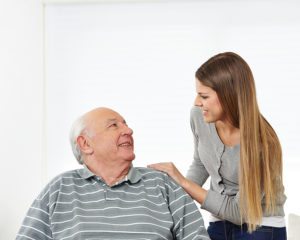Behavioral Issues to Expect with a Head Injury
Senior Care Darby PA

A head injury can drastically change how a person thinks or behaves. Each person with this type of traumatic injury is affected differently, but along with changes in their personality, they may experience a lack in judgement, impulse control, and memory.
Even if the elder were to make a full recovery by medical standards, there is still a chance they will never be the same person again. Depending on the severity of the elder’s head injury, a senior care provider may be needed to help with the decision-making and to give them the support needed to cope with the challenges that lie ahead of them. To better prepare for the changes they may be faced with, it is important to know what to expect with each change in their behavior.
Memory Problems
Short-term memory is a common issue with head injury survivors. Things they learned prior to the injury will most likely be remembered, but any new skill or information obtained after the injury will be challenging for them to remember. They will most likely also have problems concentrating.
In order to help your loved one cope with their memory loss, there are several ways you or an elder care provider can help, such as:
Focus on one task at a time instead of multiple tasks.
Distractions should be reduced, including noise from the TV, radio, or other people in the room.
Once you give the elder new information, ask them to repeat the name of the person or item you mentioned.
Encourage them to write all important information down, including appointments and phone messages.
Stick to a daily routine and keep all items in the same places around the house.
Emotional Problems
For some people with head trauma, they are unable to show any kind of emotion. This includes the ability to laugh, smile, get mad, cry, or show enthusiasm to topics or items they would usually show these emotions to. First of all, try not to take it personal. The senior’s inability to show how they are feeling has nothing to do with you or anyone else and everything to do with their head injury. Something you can do to help is show your loved one what the proper emotions are for each situation. For example, if something happens that is funny, let them see you laugh. Or if something happens that upsets you, show the senior your angry side.
On the other end of the spectrum, people with brain injuries may actually show volatile emotional mood swings. They may overreact to certain situations by suddenly crying, becoming angry, or laughing for no apparent reason. Try to show the senior calmer ways to show their emotions, helping them control their abundance of emotions.
Aggressive Behaviors
Aggressiveness is another common problem among head injury victims. They may be calm one minute and violent the next. It is important you handle the situation in a calm manner in order to try to help their reaction become more composed. Unless they are being violent towards you, themselves, or other people, ignore the behavior. Showing that you understand why they are upset may also help them calm down. Being too confrontational and arguing with the senior will make the situation much worse, so remain calm at all times.
There are a wide range of behavioral changes that can be expected among people with head injuries. Talk to your loved one’s doctor to find out what else is to be expected from this condition.
Source: https://www.caregiver.org/coping-behavior-problems-after-head-injury
If you or an aging loved one are considering Senior Care Services in Darby PA, please contact the caring staff at True Direct Home Health Care today.
- How Home Health Providers Offer Education Amidst Physical Health Changes - March 5, 2024
- Spring Activities for Seniors - February 21, 2024
- How to Help an Older Loved One with Cataracts? - February 6, 2024
